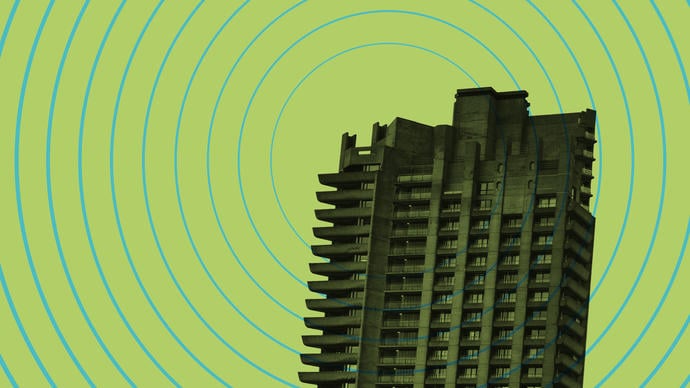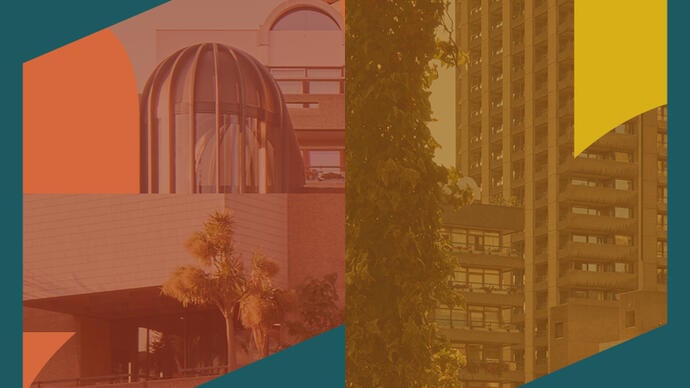George the Poet: Live from the Barbican
Start time: 8pm
Approximate running time: 60 mins, no interval
Please note all timings are approximate and subject to change.
This performance is subject to government guidelines.

George the Poet talks Common Ground and community with Michael Appouh.
George Mpanga has never settled for easy answers. The north-west Londoner, whose work gained recognition for its combination of lyricism, musicality and prescient social commentary, has always been an ambitious storyteller. As a poet, he demanded more from the medium, creating work that could translate his experience as a young black man living in London’s inner city through albums and live performances. He immersed his audience even further with the award winning, Have You Heard George’s Podcast?, dropping listeners directly into scenes from George’s experience and viewpoint. In this performance, The Common Ground Show, he takes his ambitions one step further, adapting a new chapter of his podcast to the stage. Backed by a twelve-piece ensemble made up of members of the BBC Concert Orchestra, and allowing the audience to directly contribute via interactive Q&A, George the Poet promises a unique combination of spoken word, music and storytelling.
Hailing from St Raphael’s estate, community has been a consistent theme in George’s work. Influenced by his hometown, George started MCing then eventually found his voice in poetry and with it an avenue for change. ‘I just started venting to my webcam 10 years ago, in the form of poems. I felt it was my job to break down the frustrations that a lot of us feel in the community, because I was saying things that I didn't hear people say.’ George shares. He’s maintained his connection to his community in his work through the use of black music which plays a major role in his spoken word and podcast. ‘And because we rap, we fit more ideas into our popular songs than every non-rap community, every non-rap genre. So, there's a unique power in this music.
‘But podcasting,’ George says, ‘You can have a whole conversation that has gone out to thousands, sometimes millions of people, and they have enough space to feel your personality, to see your thinking.’ Being able to wholly express one's experience to an invested audience proved compelling to George, whose thoughtful musings over half hour episodes have captivated audiences worldwide and acquired global critical acclaim. After a short hiatus from the music industry, George decided podcasts would be the next medium he would bend to his will. Leaning into his skills as a storyteller and pairing them with award-winning producer Benbick’s engrossing sound design has given the podcast an inventively unique narrative flair.
‘The podcast was my way of bringing together all my observations about the community in the most creative way,’ he says – a statement he certainly delivered on, winning multiple awards at the British Podcast Awards and being the only European recipient of a Peabody Award for Podcasting. Describing it as a current affairs magazine, Mpanga hopes it can act as the well of knowledge that his younger self felt alienated from. ‘I’m trying to speak to people who were like me when I was a teenager. Curious about how the world works but they don't want to hear all of that same old.’ Being a new, fascinating example of the fictive possibilities of digital media, and also one of the smartest voices about, was more out of necessity rather than spectacle according to George. ‘The only reason I think this podcast is a good idea is because I can probably achieve the action via the podcast. Instead of me making poems saying education needs to be entertaining and exciting, let me just educate you in a way that's entertaining and exciting.’
The experience of recording the podcast has also highlighted the importance for recognising and sharing one’s own story for George, who despite writing and performing for a decade, now finds comfort writing from a personal place. ‘The first thing that I realised when I had my little two-year break was that I keep looking for stories outside of me. Big stories, because my theory was that the bigger the story, the more people you bring in. But the problem with these talking points is that I don't really have a first-hand experience of all of them. Whereas, if I write about what I know, and I challenge myself to make people want to hear it, I can never run out of material.’ Introspection and time away from the limelight also gave him the mental space and focus to embark on a PhD researching the potential for black music – rap in particular – to act as a catalystfor social power and economic progress. ‘I'm trying to demonstrate that if you look hard enough at your life, you're going to have enough information to figure out what needs to be fixed. I think in all of my podcast episodes, I try to give you that from a different angle.’
Moving back into the space of live performance will also bring its own innovations for George, who cites a visit to the Barbican as the inspiration for the immersive style of his podcast. ‘It’s a full circle moment’ he says, ‘The way I've approached it will be like a new version of the theatre. The way we'll be able to control the sound in the Barbican is going to be magical.’ Live interaction with the audience is also an aspect he sorely misses, explaining how he often ‘obsesses over’ how an audience receives his work. As one of the most prominent voices in the podcast space, listeners will be looking to George for his thoughts on the major issues of the past year, a responsibility he’s aware of. ‘I'm still figuring out what the role of the performer is. On the one hand, I do want to talk about the past year but on the other hand, do I really or am I just saying that because everyone's expecting it? That's something that I've grappled with throughout this new chapter. There's an intention to speak to the public conversation there. But we all think that there's one conversation. And we all define that conversation differently.’
Ultimately for George, what people can take from his words is what’s most important.
‘People can learn from my story. Our story is our power. That's where our music keeps coming from. It's our story. That's our secret weapon. No one could have given us that skill, no government was going to invest in that. Yet still here we are. It was not supposed to happen. But the story is too powerful.'
There will be a live, interactive Q&A as part of this performance, you can ask George a question by tweeting @georgethepoet with the hashtags #GTPCG and #AskMeAnything.
Start time: 8pm
Approximate running time: 60 mins, no interval
Please note all timings are approximate and subject to change.
This performance is subject to government guidelines.
Performers
George the Poet spoken word
Benbrick composer
Opening artists, performing ‘Here Comes the Sun’
Sophia Thakur spoken word
Lisa Canny harp
BBC Concert Orchestra
Charles Mutter (leader) 1st violins
Everton Nelson
Rustom Pomeroy 2nd violins
Edward Bale
Clifton Harrison violas
Helen Knief
Benjamin Hughes cellos
Matthew Lee
Dominic Worsley double bass
Lianne Barnard flute
Derek Hannigan clarinet
Ruby Aspinall harp
Produced by the Barbican
Watching on the night

Watching on the night
Once you've bought your online ticket and show time is approaching, follow the link below to watch live
Discover

Listen: Barbican Recommends
Not sure what to listen to? Every month we update our Barbican Recommends Spotify playlist with what we've been listening to in the office. Expect everything from Punk to Jungle to Classical.
Venue
Location
The Barbican Hall is located within the main Barbican building. Head to Level G and follow the signs to find your seating level.
Address
Barbican Centre
Silk Street, London
EC2Y 8DS
Public transport
The Barbican is widely accessible by bus, tube, train and by foot or bicycle. Plan your journey and find more route information in ‘Your Visit’ or book your car parking space in advance.
We’ve plenty of places for you to relax and replenish, from coffee and cake to wood-fired pizzas and full pre-theatre menus
Mobility
Spaces for wheelchair users in row U at the rear of the stalls (up to sixteen, depth of row 180cm) and the back row of the circle (four), both with fold-down companion seats. Some seats in row S of the stalls for people with very limited mobility.
Assistance dogs
Assistance dogs may be taken into the concert hall where there are a limited number of suitable seats in row G of the stalls. If you prefer, you may leave your dog with a member of the cloakroom staff during the performance.
Hearing facility
There is an induction loop in the concert hall. You can use this by adjusting your hearing aid to the ‘T’ setting.
Free large-print programmes
These are available for most of our concerts. Please contact [email protected] at least a week beforehand, to prebook a large-print programmme.
For more access information, please visit our Accessibility section.





